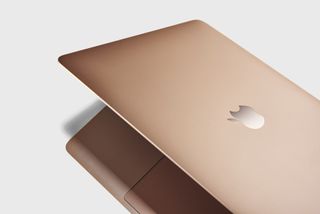MacBook with first ARM chip is coming — and it will blow away Surface Pro X
Apple will reportedly sell the first Mac with its own 12-core ARM processor next year

The Intel era for Apple’s Mac computers could be coming to an end, and Microsoft is about to be put on the defensive. A new report says that Apple will start selling Macs — likely a MacBook — by 2021 with its own A series processor with 12 cores.
Apple’s chips inside the iPhone and iPad already rival the power of Windows-based PCs, but the first 5-nanometer system-on-a-chip for Macs will reportedly be “much faster” than the A14 processor in the iPhone 12, according to Bloomberg.
This chip will put even more pressure on the Surface Pro X, which is powered by Microsoft's SQ1 chip and offers middling performance. The Surface Pro X also suffers from app compatibility issues, something Apple should be able to overcome with its walled garden approach.
- The best laptops right now
- MacBook Pro 2020: Release date, specs, price and more
- Just in: Apple Watch 6 could help fight against coronavirus — here's how
Apple won’t replace Intel overnight, but there’s an initiative to build multiple chips at the company, codenamed Kalamata. The first Mac processors will reportedly have eight high-performance cores, codenamed Firestorm, and at least four energy-efficient cores, called Icestorm.
By comparison, the iPad Pro 2020 has four high-performance cores and four for low-power tasks. And the new MacBook Air has just two cores.
The A12Z Bionic chip in the iPad Pro 2020 already wipes the floor with the Surface Pro X. On Geekbench 5, which measures overall performance the iPad Pro 12.9 scored 4,720 on the multi-core portion and 1,126 on the single-core test. The Surface Pro X hit just 2,824 and 737, respectively, according to Geekbench.
So which Mac will get this Apple chip first? The report says to expect a laptop. Apple won’t be able to provide the same high level of performance currently offered by MacBook Pros, the iMac or Mac Pro desktop. That leaves a possible return of the 12-inch MacBook, which is rumored to be coming back with an ARM chip.
Sign up to get the BEST of Tom’s Guide direct to your inbox.
Upgrade your life with a daily dose of the biggest tech news, lifestyle hacks and our curated analysis. Be the first to know about cutting-edge gadgets and the hottest deals.
One challenge is getting macOS to play nice with the new ARM-based chips while continuing to run legacy Intel-compatible apps. But Apple has been working behind the scenes to minimize friction and avoid Microsoft’s stumbles with the Surface Pro X, whose SQ1 ARM chip was co-developed by Microsoft and Qualcomm.
In fact, the Kalamata project has been going for “several years.” And Apple reportedly developed a Mac chip based on the previous iPad Pro’s A12X CPU. Bloomberg says that Apple’s software, hardware and component-sourcing teams are collaborating closely.
Part of the reason Apple has not released new Macs that frequently in recent years is that Intel’s pace of innovation has slowed. For example, the latest 10th gen Intel Ice Lake processors are based on a 10-nanometer process. Apple is working on 5nm chips for its Macs.
This transition is definitely going to take some time. But overall a move to in-house processors is a surefire sign that Intel’s days are numbered on Apple computers.
Mark Spoonauer is the global editor in chief of Tom's Guide and has covered technology for over 20 years. In addition to overseeing the direction of Tom's Guide, Mark specializes in covering all things mobile, having reviewed dozens of smartphones and other gadgets. He has spoken at key industry events and appears regularly on TV to discuss the latest trends, including Cheddar, Fox Business and other outlets. Mark was previously editor in chief of Laptop Mag, and his work has appeared in Wired, Popular Science and Inc. Follow him on Twitter at @mspoonauer.

